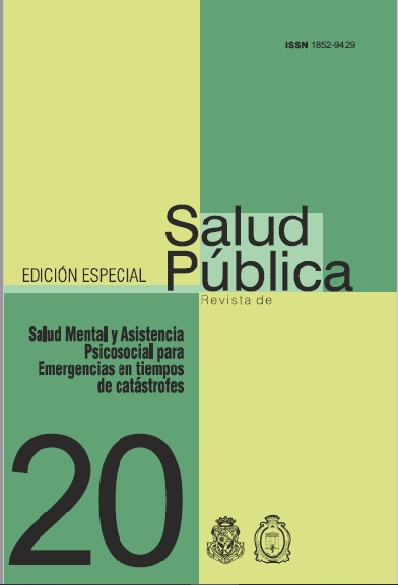Salutogénesis y trabajo de recursos como base de la apspe y sps
Palabras clave:
SPS, salutogénesis, recursos individuales y comunitarios, pares, estrés, eventos críticosResumen
En el cuadro de la Asistencia psicosocial para Emergencias (APSPE) el Sostén psicosocial (SPS) se ocupa de las personas afectadas y de los equipos de rescate en los primeros días después del evento crítico. Solo puede hacerse con éxito a condición de que la actitud sea preventiva y no clínico-terapéutica. Los sobrevivientes no heridos físicamente no están enfermos, sino que sufren de las consecuencias mentales del peligro vivido, la impotencia y conectado con ésto el estrés excesivo. No están locos y por eso no necesitan tratamiento. Según las directivas de “Salud para Todos” los voluntarios formados están bien dispuestos como managers del estrés y dueños de la psicoeducación. Así el umbral de buscar ayuda baja considerablemente. sicólogos de emergencia tienen su papel en el trasfondo de catástrofes. De este modo se puede garantizar la prevención (secundaria) de daños psico-somáticos en afectados y personal de rescate debido a eventos críticos. Redes interprofesionales, interculturales y transnacionales tendrían que establecerse – al menos en Europa con sus variedades culturales, linguisticas, religiosas etc. en un territorio chico.
Descargas
Referencias
1 Beerlage I, Hering T, Nörenberg L. Entwicklung von Standards und Empfehlungen für ein Netzwerk zur bundesweiten Strukturierung und Organisation psychosozialer Notfallversorgung. Zivilschutzforschung, Bd. 57. Bundesamt für Bevölkerungsschutz und Katastrophenhilfe, Bonn 2006
2 Caplan G.Principlesofpreventivepsychiatry. Basic Books, New York 1964
3 Perren-Klingler G.Hg. Trauma, from individual helplessness to group resources. Paul Haupt,Bern 1998
4 Gschwend G. Trauma-Psychotherapie. Hans Huber, Bern 2004
5 Hobfoll SE. Conservation of resources. A new attempt at conceptualizing stress. American Psychologist 1989 (44):513–24
6 Tedeschi R, Calhoun L Posttraumatic growth: conceptual foundations and empirical evidence PsycholInq 1996 15 (1): 1-18
7 Salmon TW War neuroses and their lessons. New York Medical Journal 109: 993–994 1919
8 Shalev AY. Manejo del estrés y sesiones informativas. En: Raphael B, Wilson JP (eds) Interrogatorio psicológico, teoría, práctica y evidencia. Cambridge University Press, 2000
9 Bouchardy C, Raymond L, Levy F, Probst-Hensch N, Tubiana M, de Wolf C. Ist es berechtigt, die Wirksamkeit der mammographischen Früherkennungsuntersuchung in Frage zu stellen? Schweiz.Ärztezeitung2001 82(13):648–49
10 Engelhardt D von Erklären und Verstehen in der Psychiatrie. Genese und Bedeutung im Kontext der Medizin- und Philosophiegeschichte. ZS für medizinische Ethik 2011 7(2):103 ff
11 Flannery RB Ein Aktionsprogramm für tätlich angegriffenes Psychiatriepersonal. In Perren-Klingler G (Hrsg) Debriefing, erste Hilfe durch das Wort. Paul Haupt, Bern 1999
12 Brian Allen M, Brymer J, et al Perceptions of psychological first aid among providers responding to hurricanes Gustav and Ike. JTraum Stress 2010, 23(4):509–513
13 Hobfoll SE, Watson PE, Bell CC, Bryant RA, BrymerMJ Perceptions of psychological first aid. Disaster psychology. Practices and programs, vol. 2. Westport, CT, pp 1–12 2007
14Antonovsky A. Unravelling the mysteries of health: how people manage stress and stay well. Jossey Bass, San Francisco 1987
15 Selye H. Stress and the General Adaptation Syndrome, Brit. Med. J 1950 1 (1383 – 1392)
16 Porges SW. The Polyvagal Theory, neurophysiological Foundations of Emotion, Attachment and Self Regulation. WW Norton + Company 2011
17 Mollica R F. Assessing symptom change in Southeast Asian refugees, survivors of mass violence and torture Amer J Psychiatry 1990; 147:83–88
18 Perren-Klingler G Ed. Debriefing modelos y aplicaciones: de la historia traumática al relato integrado. InstitutoPsicotrauma Suisse - Suiza 2003
19 Müller-Cyran A. Krisenintervention im Rettungsdienst. In: Bengel J (Hrsg.) Psychologie in Notfallmedizin und Rettungsdienst, 2. Aufl. Springer, Berlin Heidelberg, S 61–68 2004
20 Bandura A. Self efficacy, the exercise of control. W.H. Freeman, New York1997
21Sherf S, Schreiber G Fortgesetzte Raketenangriffe: Erfahrungen des Barzilai Medical Center in Ashkelon /Israel In Perren-Klingler (Ed) Psychische Gesundheit und Katastrophe. Springer, Berlin Heidelberg, S 77 – 85, 2015
22 Perren-Klingler G Peer Deployment Handbook Prepared for the European External Action Service European Institute of Administration, Maastricht 200
23 NATO (North Atlantic Treaty Organization, OTAN ) Psychosocial care for people affected by disasters and major incidents. A model for designing, delivering and managing psychosocial services for people involved in major incidents, conflict, disaster and terrorism. Euro - Atlantic Partnership Council, June 2008 WP
24 EisenbergD,GolbersteinE,GollustSE.Help-seeking and access to mental health care in a university student population. Med Care, 45,594–601,2007
25 Kropotkin P (1975) Gegenseitige Hilfe in der Tier-und Menschenwelt. Kramer, Berlin; Reprint von 1908
26Antonovsky A. The implications of salutogenesis: an outsiders view. In: Turnbull JP, Behr S, Murphy D et al. (eds) Cognitive coping, families and disability. Paul H. Brookes, Baltimore 1993
27 Janoff-Bulman R. The aftermath of victimization: Rebuilding shattered assumptions. In: Trauma and its wake: Ed Figley Ch. The Study and Treatment of post-traumatic stress disorder 1 :15–35 Raven Press, New York 1985
28 Seligmann MEP. Learned optimism: how to change your mind and your life. Random House, New York 1990
29 Schauer M, Ruf-Leuschner M. Lifeline in der Narrativen Expositionstherapie. Psychotherapeut 2014; 59 (3):226–238
30 Rossi A, Maggio R, Riccardi I, Allegrini F, Stratta P. A quantitative analysis of antidepressant and antipsychotic prescriptions following an earthquake in Italy. J Traum Stress 2011; (24):129–132
31Mancini AD, Prati G., Black S.Self worth mediates the effects of violent loss on PTSDsymptoms. J Traum Stress 2011; (24):116–120
Descargas
Publicado
Número
Sección
Licencia
Derechos de autor 2020 Universidad Nacional de Córdoba

Esta obra está bajo una licencia internacional Creative Commons Atribución-NoComercial 4.0.
Aquellos autores/as que tengan publicaciones con esta revista, aceptan los términos siguientes:
Se permite la generación de obras derivadas siempre que no se haga con fines comerciales.
Tampoco se puede utilizar la obra original con fines comerciales.
Se permite y recomienda a los autores/as difundir su obra a través de redes sociales profesionales o en su página web, luego del proceso de publicación a los fines de aumentar la visibilidad del su investigación.



